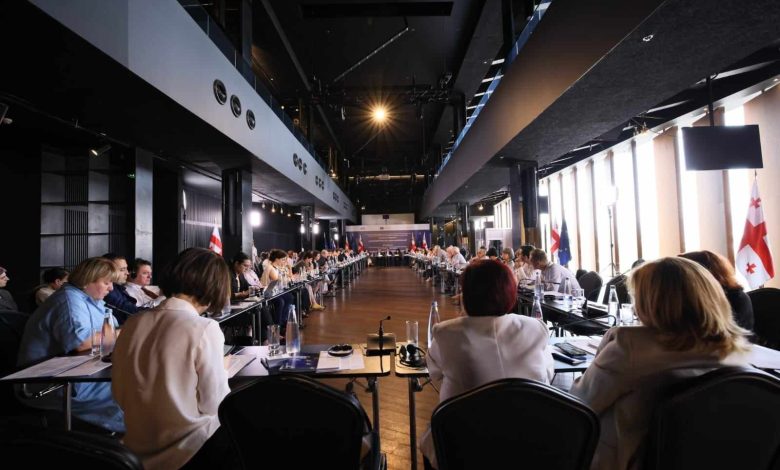
Government, CSOs Talk at the EU-sponsored Conference
The conference “Georgia’s Way to the European Union,” jointly organized by the Parliament of Georgia and the Eastern Partnership (EaP) Civil Society Forum’s Georgian National Platform, took place on July 25. EU Ambassador Pawel Herczyński was co-chairing the conference.
This was a rare occasion for a meeting between the ruling party officials and CSOs, whose relations have been chilly after the attempt of the ruling party to pass the Russia-styled law “On Transparency of Foreign Funding” and the government’s orchestrated efforts aimed at shrinking the civic space.
The participants discussed key issues of Georgia’s path to the European Union related to judicial reform, electoral issues, and de-oligarchization. Ensuring consultation with and the meaningful participation of CSOs is one of the conditions for the EU candidacy.
Speaker’s Assessment
In his assessment of the conference, the Speaker of the Parliament, Shalva Papuashvili, thanked the Civil Platform for organizing the event and engaging diverse civil society.
“As for the opposition, unfortunately, they left the conference in the middle of it, which shows their real interest in the issues put on the agenda,” the spokesman noted. He added: “Finally, we see that, unfortunately, the EU candidacy is being used by a part of the opposition as an instrument of pressure on the authorities, for blackmail, and disorder. When they realize that the discussions are professional and peaceful, they refuse to participate, as we witnessed today”.
He also stressed that the conference’s success would serve as a basis for organizing future meetings of a similar format, saying, “I believe it was the first successful conference, and it will serve as a successful and experienced pillar to organize meetings of the hereof format further.” Several issues arising from the Association Agreement, including environmental and economic issues, will be further discussed as they impact the lives of Georgian citizens and align with the spirit of the European Union.
EU Ambassador’s Assessment
In his opening speech, EU Ambassador Pawel Herczynski stated: “We encourage everyone to ensure genuine inclusiveness of all members of the civil society in the reform efforts. I hope this conference will prove to be an important step in that direction,” referring to the 12 Priorities (Priority 10) that the European Commission is set to assess in October.
The Ambassador also reiterated that creating and maintaining an enabling environment for civil society organizations is at the core of any democracy. However, he cautioned against initiatives that could discredit campaigning or policy and potentially have a chilling effect on civil society, stating that such actions would be inconsistent with EU norms and values.
Ambassador Herczynski highlighted that the European Commission recently delivered an oral update to member states, assessing Georgia’s progress on the 12 priorities. The update came with recommendations on how to continue addressing the outstanding priorities. This included a recommendation that “Georgia needs to resume constructive dialogue with the civil society and implement regular and transparent consultations,” added Ambassador.
Ambassador Herczynski acknowledged the challenges ahead and recognized the importance of making compromises and finding common ground in addressing outstanding recommendations to “make the most of this unique window of opportunity.” He said, “I believe it is possible because the majority of the politicians and the members of civil society have a common purpose – to help Georgia advance on its European path – a choice supported by the overwhelming majority of Georgia’s population.”
CSO’s Assessment
Nona Kurdovanidze, Chairman of the watchdog Georgian Young Lawyers Association (GYLA) told Civil.ge: “In general, a meeting of this format has been rare recently, and in this regard, it can be said that it was interesting, although we did not expect it to lead to any significant results.”
During the conference, Kurdovanidze addressed the challenges in the justice system and expressed concerns about the parliament’s current actions, stating that they failed to address the essential issues. She stressed the control exerted by an influential group of judges within the Supreme Council of Justice as the judiciary’s main problem and emphasized, that the current legislation curtails its independence.
Keti Khutsishvili, the Executive Director of the Open Society-Georgia Foundation, told Civil.ge that she emphasized the need for systemic changes necessary for de-oligarchization, for preventing “one person with significant wealth from exerting influence over the country and controlling the ruling party.” The media sector has seen some progress, she said, mainly due to the President’s decision to pardon Nika Gvaramia. However, Khutsishvili emphasized that more improvements in various areas are needed to tackle the problem of oligarchic influence effectively.
Guram Imnadze, a representative of the Social Justice Center, stressed the need for a more systematic and fundamental reform in the justice system. He highlighted that the reform should begin with the High Council of Justice, a crucial part of the justice system. However, he expressed concern that the draft law currently under review fails to address this issue.
Also Read:
- 17/06/2022 – Conditions First, Candidate Status After – EU Commission Recommends on Georgia
- 17/06/2022 – European Commission’s Memo Detailing Recommendations for Georgia
This post is also available in: ქართული Русский